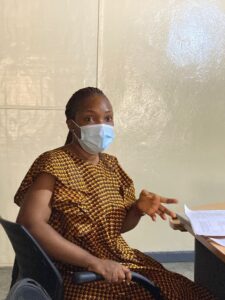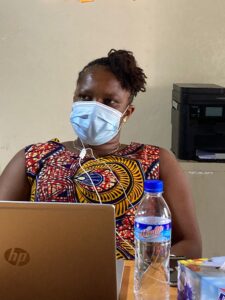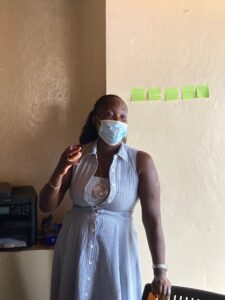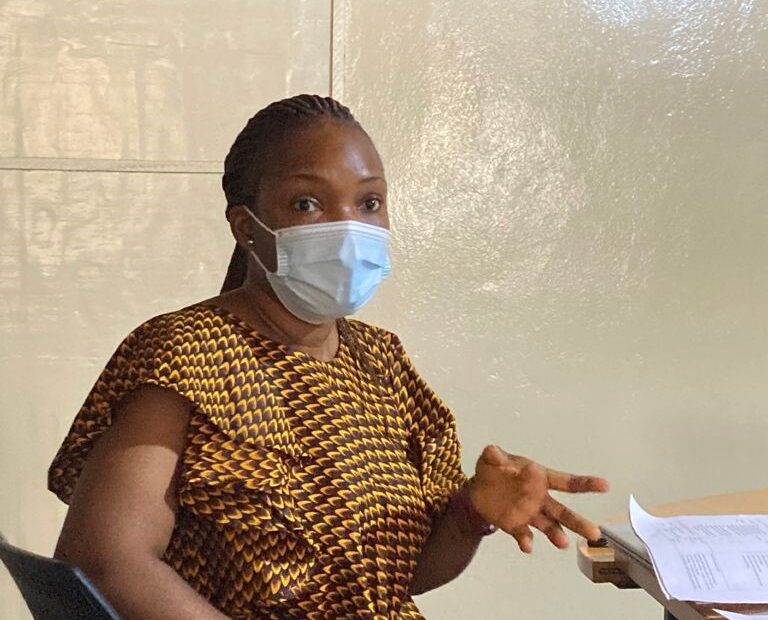By Sally Theobald, Colleen Parker, Hannah Berrian, Wede Tate

Colleen Parker

Hannah Berrian

Wede Tate
I am delighted to be back in Liberia, working face to face with our REDRESS team after 2 years of discussing and making decisions down a laptop. I am also happy to be In Liberia on the International Day of Women and Girls in Science and I sat down with REDRESS colleagues Hannah Berrien, Wede Tate and Colleen Parker to learn more about their journey in science and global health research and delivery and their reflections and advice for women and girls interested in a career in this area. In REDRESS we are undertaking multidisciplinary participatory health research with a person-centred approach at its heart to improve the care of people affected by severe stigmatising skin diseases in Liberia, such as leprosy, lymphatic filariasis and onchocerciasis. To date we have conducted our formative research and are now in the process of designing, rolling out and evaluating interventions that respond to our findings together with the Ministry of Health. Hannah’s specialist area is patient centred approaches and she plays a key role in our pathway 3 working group “patient engagement and person centred approaches”; whereas Wede focuses on human resources for health is part of REDRESS pathway 2 “Enhancing the performance of a core management team for Severe Stigmatising Skin Diseases (SSSDs)”. Colleen is research officer health information system, monitoring and evaluation and research division at the Liberian Ministry of Health and a core part of the REDRESS team, where she is the information management officer supporting strategic linkages with governmental systems and structures.
What are you proud about in your REDRESS journey so far?
Hannah: “ I am proud about how we have collected data on patient advocates and people affected by disability and mental health and Ebola – we are able to learn from them about the different steps that enabled them to become a patient advocates and apply these steps in REDRESS – to develop a peer support group for people affected by Severe Stigmatising Skin Diseases – the first of its kind in Liberia which we hope will support addressing and alleviating isolation and discrimination”.
Wede: “I like the skills development that we have experienced working in REDRESS, leaning new approaches such as photovoice, and capacity budling, this boosts morale. I am proud of the impact REDRESS has made, for example in the formative phase, researching together with the community and stakeholders in general, the way they appreciated our work and the sharing and discussion of our findings. We were commended by community stakeholders and the county health team”
Colleen: “I am proud of our knowledge and the trainings that we received and also deliver, this improves our working experience and our contribution and leaves a legacy”.
Globally, only 33 per cent of researchers are women, and women are less likely to be promoted and are awarded less research finding than men. We need to change this – and I asked my Liberian colleagues what advice they have for women and girls interested in pursuing science and/or global health?
Hannah: “My advice to women and girls interested in science is that its exciting – you travel and see places you have not imagined you will go. It was through science that I was able to travel to the other parts of my country and got to understand that there is a need for psychosocial support for people affected by SSSDs and excitingly that health care providers (of different kinds and levels) are willing to partner to provide support. Secondly Science is an ongoing process. Go for it! It’s rewarding.”
Wede: “I encourage women and girls to pursue their dreams in science and not to underestimate themselves. Feel passionate, be innovative and believe in yourself and your work. Don’t be afraid to try out new things. Be brave and explore avenues by reaching out for help when needed.”
Colleen: “I want to start by saying that science is an amazing world and I think women and girls in science should always speak up and don’t be afraid of taking credit for the work done, because women and girls we don’t speak up as much as we should and that makes it harder in terms of visibility. So, I believe women and girls should follow their heart and try to find opportunities that interest them and work tirelessly on them.”
Thank you to my Liberian REDRESS colleagues, and colleagues all over the world who are leading in science for impact and promoting equity and inclusion in science. I salute and celebrate you all for your action and leadership.
